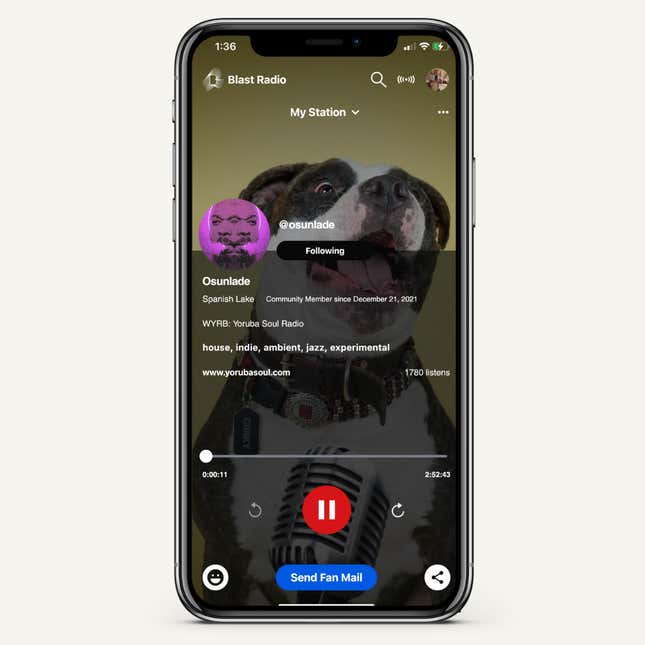Meet Blast Radio, The Social Network Beating Amazon At The Audio Game
Blast is a small platform (Ali declined to provide exact numbers), but its users are dedicated pump Amazon is funded to publish high quality content against the competition. Both apps tend to have about the same number of listening options; On a weekday morning, the booster had 24 streams and the Blast had 20. Sometimes the Blast had more. The explosion is also better. You don't have to be an audiophile to notice the subwoofer's strong digital compression. Blast, a small startup in Brooklyn with seven employees, is competing with a manufacturer from one of the world's largest technology companies.
"What makes Blast different is the potential for freedom," said Carl Craig, Grammy-nominated producer, DJ and pioneer of Detroit's techno scene. "You can go through the whole release and take it wherever you want. Because things don't come out for weeks, there's more room for experimentation. It's like terrestrial radio that way, except you can play whatever you want. Creatively, it feels good."
Radio Blast is algorithm-free
There is an incredible wealth of content in Blast. An anonymous user listens to old Detroit AM radio recordings. A preacher delivers sermons. A user named SportsReplays runs a classic sports simulation in the Boston area and comments on what happens. Unlike traditional radio, there are no far-right talk shows here, at least not yet. According to Ali, hate speech and other toxic content are not welcome on Blast, although there are no critical moderation errors.
Then there are the rock stars. He used the Animal Collective platform to play demos and early tracks from a recent album. Superstar DJs play hour-long sets every night. Roy Molloy, an Australian musician with an indie cult following, hosts a rousing daily show called Illegal Radio Drive Time Power Hour . Like all great games, Molloy accompanies his performances with a more colorful slogan than you'll hear on AM/FM: "Tune in or out."
The word "illegal" in the title of Molloy's show is a clear reference to the fact that even though users listen to copyrighted music, Blast has no licensing agreements with record labels. Platforms like Blast are subject to the Digital Millennium Copyright Act. Essentially, the DMCA protects companies from infringing on users' copyrights, regardless of what users post and communicate. They delete the content after one day in each rights owner Request . However, since blast currents dissipate within 24 hours, The company is in a gray area. Blast says it's completely legal.
That says it all Artists don't get paid for playing songs on Blast. But Gizmodo spoke to several musicians and music industry professionals, and they all said they're fine for now.

says Sam Valenti IV, founder of the Ghostly International label. "It kind of reminds me of Napster. The music industry described it as heavy, but really it was just a way for a lot of kids to share and find music. It's something that's missing today.
The most impressive thing about Blast Radio is what it doesn't have. Application is easy as pie. Stream, listen, subscribe to your favorites and hit the like button that emits a soft, warm glow to the streamer's microphone. This is. There is no comment section, but you can post a message with critical advice just like on Twitch. The main stream does not rely on an algorithm to recommend content, and live streams do not rely on instant comments like TikTok or Instagram. Exploding is a human experience. It is a completely new format.
"I think its success is part of a larger effort to get rid of the phone. We're used to pushing it everywhere," Valenti said.
You don't have to be an international star like Craig or the guys from Animal to appreciate this. I was experimenting with my radio show on Saturday night Play songs, insert audio from YouTube clips and chat with friends. It doesn't matter when it's live, people are listening. However, because Blast limits audience engagement, the platform has removed the pressure you feel on Instagram or TikTok (and you don't have to worry about your appearance). Blast is a serious but forgiving tool that encourages users to try new things.
Put the radio blast on the Internet. It's better than it looks.
There was a joke in the HBO series Silicon Valley that putting radio on the Internet was the dumbest idea in technology. It's the 100th anniversary The deafening technique works perfectly. However, from a business perspective, there is a reason why people keep trying.
According to the Pew Research Center, 83% of Americans ages 12 and older listen to terrestrial radio at least once a week, a number that includes a decline that has accompanied pandemic shutdowns. In other words, there would be a lot of money at stake if he could capture a piece of the radio market.
"A lot of coastal elites have the idea that radio was something we all grew up with, when it ended when we started using iPods and became hipsters," Ali said. "But once you start pulling that string, you realize that radio is still the primary medium. Not just audio, but all media."

Some of the spells come with the Blast device. They feel comfortable in the hand, are intuitive and the portability makes them even more enjoyable. You can connect the Blast Mic to your smartphone's WiFi hotspot and stream from almost anywhere, opening up unexplored creative possibilities. Blast captures the best aspects of radio while avoiding all of its problems. You don't get flashy ads every five minutes, song selection is free of corporate interference, and nasty political incitements are always absent.
Illegal Radio Uptime Power Hour (IRDTPH for short) by Australian saxophonist Roy Molloy is accepting requests via email and in the Discord chat room. "It's kind of hyperbole to have all these algorithms telling us what to listen for and where to go," Molloy said. "There's a purity to the form of radio" where a human chooses the songs, not a computer program, and you have no control over what you hear. "You vote and you get what you get," Molloy said.
Of course, it's easy to love a social media app when it's just in its infancy, when everything is rosy and people are having fun. Here's what Blast looks like now, but Facebook has also gone through its honeymoon phase. If the platform takes off and people stick with it, it could open up a whole new kind of content for artists, creators and listeners. Or it can be made into a container like those found elsewhere on the internet.
The tipping point will likely come when Blast opens up the platform, allowing you to stream directly to your phone without using the company's products, which is likely inevitable if the company expands. This can flood the app with low-quality content, destroy privacy, and lead to misinformation, hate speech, and all the other bad stuff found on major platforms. Of course, this only happens when the critical mass of the explosion is reached. Ali said these are issues he would like to address.
"With that meaningful listening experience, that comfort and that personal connection, you can go into a trance," Ali said. "That's what's special about the voice. It's a challenge, but that's what I'm trying to create, both for listeners and broadcasters."


